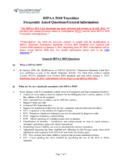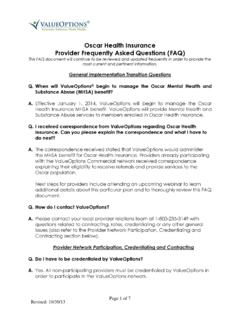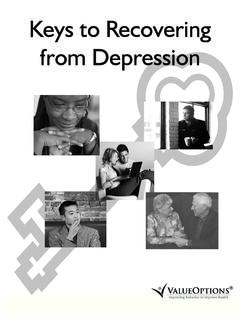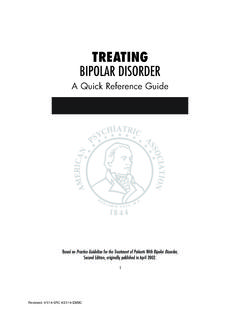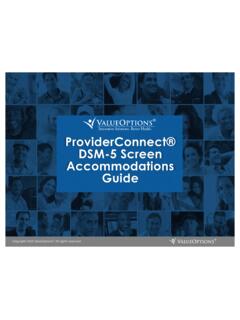Transcription of Spotlight - Beacon Health Options
1 1 Valued Provider eNewsletter | Cover ArticleMay 2015 Spotlight :Provider Handbook Read MoreUpcoming Webinars Read MoreContact Us Read MoreDispelling myths about Mental Health to Overcome StigmaAlthough an estimated 25 percent of Americans will experience a mental disorder in any given year, fewer than one-third of adults and one half of children with a diagnosable mental disorder receive any mental Health services. Stigma still discourages people from getting help, despite advances in education and research. By learning the truth about mental illness and encouraging others to do the same, you can help lessen the is stigma? Stigma describes the shame, fear and discrimination that results from stereotypes surrounding mental illness. It can affect people with a mental illness psychologically and even economically, when it comes to finding housing and employment.
2 Stigma can cause family tension and rejection. It also leads to fear, mistrust and violence against people with mental illness. As a society, we are bombarded with negative images of mental illness, explains Michelle Pruett Nostheide, Director of Public Education at Mental Health America. The media and entertainment industries overwhelmingly present people with mental illness as dangerous, violent and unpredictable individuals, Nostheide says. myths about mental illnessMedia stereotypes often portray people with mental illness as failures or villains, and terms such as schizophrenia and psychotic are frequently PROVIDER eNewsletterIn this Issue: dispelling myths about Mental Health to Overcome StigmaBeacon Health Options : The Road AheadMedical Necessity Criteria and Treatment Guideline UpdatesSubstance Use Disorders and ASAM Criteria for New York Health Plan ProvidersOscar Health Plan Claims UpdatesAftercare Appointments following Inpatient DischargeABA: Upcoming Coding ChangesAttention ABA Providers who Serve GHI MembersIntroducing the Vermont Integration ProfileICD9 to ICD10 - Coming AttractionsServing those who ServeProvider Treatment Record DocumentationTips and Tricks.
3 Keeping your Provider File CurrentMay ProviderConnectSM WebinarsUpcoming WebinarsContact Us:Please send your comments, ideas and suggestions for upcoming editions of the Valued Provider eNewsletter to Inc., a Beacon Health Options Provider eNewsletter | Cover Article In my position, I see outrageous marketing campaigns, movie trailers, commercials, even children s toys, that paint an unfair picture of people with mental illness, or use mental illnesses as a source of ridicule or humor, she says. People that know someone with a mental illness or have one themselves are offended or saddened by these portrayals, but the real damage is done when people who have no experience with mental Health accept these stereotypes and pass them on. You ve probably heard some of these common myths about mental illness:Myth: People with mental illness fake symptoms.
4 They re really just being : According to a survey by Mental Health America, almost 1 in 3 Americans say they believe depression is a state of mind. Behaviors resulting from mental illness can t be controlled at will. You d never hear 31 percent of the population deny that diabetes and heart disease are real, notes Michael Faenza, former President and CEO of Mental Health : Severe mental illness can t be : The efficacy of treatment for severe mental illness can be compared to that in other branches of medicine including surgery, reports research psychiatrist E. Fuller Torrey in his book Out of the Shadows: Confronting America s Mental Illness : People with mental illness are : The overall contribution of mental disorders to the level of violence is very small, Nostheide says.
5 Research has shown that the vast majority of people who are violent do not suffer from mental illness, she explains. In cases where violence does occur, the incident typically results from the same reasons as with the general public, such as feeling threatened or excessive use of alcohol or drugs. Myth: Children and teens don t experience mental : Twenty-one percent of children ages 9 to 17 have a diagnosable mental illness. Half of all lifetime cases of mental illness begin by age 14. Early identification can significantly improve quality of can helpEven in the last decade, the media has become more sensitive to mental illness. The general public also has become more knowledgeable. However, there still is a long way to importantly, educate yourself. You can then help educate others and gently point out stigmatizing behavior.
6 Further, you can insist on media and government accountability. Contact your local mental Health organization or the offensive media outlet when you hear stereotyping and support funding and legislation that improves mental Health care. Finally, treat people who have a mental illness with the same dignity and respect that you would give to anyone else. ResourcesMental Health America - The Substance Abuse and Mental Health Services Administration - By Kristen Knight 2003-2015 Achieve Solutions Even in the last decade, the media has become more sensitive to mental illness. The general public also has become more knowledgeable. However, there still is a long way to go. 3 Valued Provider eNewsletter | ClinicalSource: Michelle Pruett Nostheide, Director of Public Education, and Michael Faenza, President and CEO, National Mental Health Association; The Substance Abuse and Mental Health Services Administration; Out of the Shadows: Confronting America s Mental Illness Crisis by E.
7 Fuller Torrey, MD. John Wiley & Sons, 1997; Surviving Mental Illness: Stress, Coping, and Adaptation by Agnes B. Hatfield and Harriet P. Lefley. The Guilford Press, 1993; Your Mental Health : A Layman s Guide to the Psychiatrist s Bible by Allen Frances, MD, and Michael B. First, MD. Scribner, newsletter article is provided by the Achieve Solutions website. This article and other Information provided on the Achieve Solutions site, including, but not limited to, articles, quizzes and other general information, is for informational purposes only and should not be treated as medical, psychiatric, psychological or behavioral Health care advice. This article is not intended to be used for medical diagnosis or treatment or as a substitute for consultation with a qualified Health care Health Options : The Road AheadMedical Necessity Criteria and Treatment Guideline UpdatesRecently, clinical criteria was reviewed to ensure they support the clinical philosophy embodied by both parent companies, Beacon Health Strategies and ValueOptions.
8 In addition to rebranding updates, one additional statement has been added to all criteria: While level of care determinations are considered in the context of an individual s treatment history; Beacon Health Options never requires the attempt of a less intensive treatment as a criterion to authorize any service. This statement supports that a member does not need to first fail treatment in another level of care before seeking Necessity Clinical Criteria, Treatment Guidelines, and the Provider Handbook can be accessed through the provider section of the ValueOptions website and clicking on Provider Handbook. Substance Use Disorders and ASAM Criteria for New York Health Plan ProvidersEffective April 1, 2015, ValueOptions began utilizing the American Society of Addiction Medicine (ASAM) for Substance Use Level of Care Criteria for its New York Health plan members.
9 The New York Office of Alcoholism and Substance Abuse Services (OASAS) approved ValueOptions use of the ASAM criteria as required by New York s Substance Use Disorder law. To order a copy of the ASAM criteria, please go to the following ASAM Health Plan Claims UpdateOscar Health Plan is a growing insurance company that offers coverage to members enrolled in the Exchange Marketplace. They focus specifically on providing quality services to their members in the New York City area, Long Island, and soon will extend to other regions of the United States. ValueOptions manages all behavioral Health benefits for all Oscar Health Plan has recently identified that Oscar member cards note only medical claims submission information. All Oscar behavioral Health claims 4 Valued Provider eNewsletter | Regionalshould be submitted directly to ValueOptions electronically or at the following address:ValueOptions, Box 1347 Latham, NY 12110 Please contact the Provider Claims Customer Service Team (877) 759-5722 with any questions regarding Oscar Health Plan claim Appointments Following Inpatient DischargeIMPORTANT for NYS providers: Please read this carefully and share with all appropriate clinical and administrative a reminder, NYS Office of Mental Health (OMH) issued pertinent guidance effective December 10, 2014 clarifying OMH s policy regarding aftercare appointments for patients discharged from inpatient psychiatric.
10 Members being discharged from psychiatric inpatient units in New York State are now required to be referred to an outpatient mental Health provider for a scheduled appointment at a specified date and time, within five business days of discharge; Clinic open access or walk-in appointments do not meet appropriate standards of aftercare services for this population. OMH Policy:As per OMH policy, members being discharged from psychiatric inpatient units should: Have an appointment scheduled with an appropriate outpatient mental Health clinic provider within five business days of discharge. The appointment must specify a date, time, and location for the member to meet with a clinic staff member who must complete an intake and/or assessment. In addition, face-to-face assessment must be provided in an expedited manner as appropriate for the member s clinical condition.
